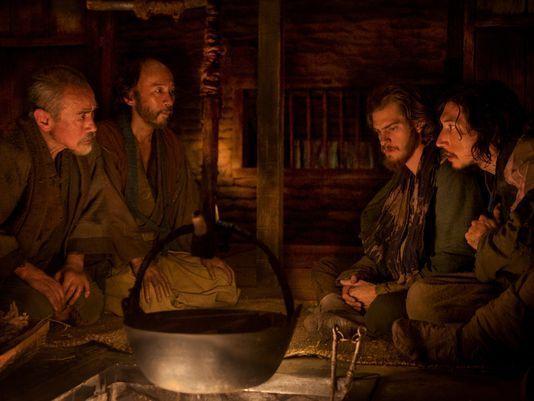Asking Questions, by Bob Connally
25 Jan
Martin Scorsese has never kept his Catholic upbringing a secret. While he has certainly never made Christian films, his lifelong internal struggle of faith has informed his work throughout his now 50 year career as a filmmaker. It is most overt in works such as Mean Streets, The Last Temptation of Christ, and Gangs of New York. But it is such a part of him that his films that don’t have at least a small piece of Christian iconography are notable for the absence of it. He is probably the only mainstream filmmaker of which that can be said. Now with Silence, Scorsese takes an unflinching look into what it means to truly be a follower of Christ under the harshest of circumstances.
In 1640 Portugal, Jesuit priest Father Valignano (Ciaran Hinds, Tinker Tailor Soldier Spy) has received tragic news about Father Ferreira (Liam Neeson). It appears that after being captured and tortured in Japan, Ferreira has denounced God. Refusing to believe that Father Ferreira is capable of apostasy, young priests Father Rodrigues (Andrew Garfield) and Father Garupe (Adam Driver) commit themselves to go to Japan to find Ferreira. Needing a guide once they get there, they enlist the help of Kichijiro (Yosuke Kubozuka), a Japanese man who had escaped from his home country due to persecution, though he vehemently denies being a Christian to the priests.
Upon their arrival in Japan, Rodrigues and Garupe find a society of underground Christians, to whom they minister quietly in the dark of night. These secret Christians are thrilled to have real priests to hear their confessions and from whom they can receive Holy Communion. Always looming as a threat to their lives and faith however, is “the inquisitor,” Inoue (Issei Ogata). Inoue is determined to root out Christianity in Japan through a calculated combination of fear and reasonableness.
With a screenplay by Scorsese and Jay Cocks (Gangs of New York), Silence is based upon the 1966 Japanese novel of the same name by Shusaku Endo. Throughout its 2 hour 41 minute runtime, it is a challenging film, particularly for people of faith. At first it is simply the question of if we think we could endure what Rodrigues, Garupe, or their yearning, frightened flock endure, trying to live as secret Christians fearing for their lives. That alone is something that we can examine in ourselves. Not content to leave it at that however, Silence goes deeper. The faithful in Rodrigues and Garupe’s congregation are threatened not only with torture but the threat of being murdered in the most horrific ways imaginable. No one has greater firsthand experience with this than Kichijiro, who may be the most interesting character in the entire film.
Kichijiro is at first simply seen as a pitiful man. Rodrigues and Garupe do not find him trustworthy. They see a drunken, unreliable clown and they feel fairly certain that if anyone is going to sell them out to Inoue it will be him. Eventually, Rodrigues reaches out to Kichijiro who gives a deeply anguished confession. It will not be his last. His weakness leads to the same conclusion multiple times throughout the film but every time he comes back to Rodrigues for confession. Rodrigues becomes increasingly aggravated with Kichijiro each time, understandably. But just as understandable is Kichijiro’s weakness in the face of torture and death. While we may want to believe we would be stronger than Kichijiro, until we are in that situation- God forbid- how can we know?
For non-Christians, Silence is a fascinating examination of a cultural struggle between Christianity and Buddhism in 17th century Japan and their inability to coexist there. While it is certainly that for Christian viewers as well, it is much more than that for us. This is a film that gives us a lot to think about in terms of who we might have been in that time and place and more importantly who we are. Each Christian character in the film- from Rodrigues and Garupe to Kichijiro and to other characters who get significantly less screen time- is at a different place in his or her relationship with God. Silence honors all of them not through presenting any of them as exceedingly heroic, but by presenting them as real people who are doing their best. They want to be Christians but they also want to be free to live in peace as Christians, which is not possible there.
It is rare that Christian characters are presented as complex individuals on film, but Scorsese is, after all, a rare filmmaker. Every shot in Silence is beautifully composed but nothing about them is flashy. It adds to the dignity of the story being told and to the characters living in it. The acting is top notch across the board, with Garfield bringing many shades to Rodrigues. Some actors may have played him a little too virtuous while others might have accentuated his flaws at the expense of his goodness. Garfield gets it just right here.
Silence is a movie I would recommend very strongly to Christian viewers that are willing to be challenged. There is comfort to be found in it too but it comes hard earned. At 74, Martin Scorsese may not make many more films. He remains, however, at the top of his game and still asking questions.




No comments yet